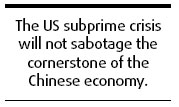Internal factors can help China tackle crisis
As the aftermath of the subprime mess unfolds, the United States is facing a serious financial crisis. Facing such a severe economic challenge, all countries are now trying to come up with viable means to ease the possible impacts upon their markets.
Now let us look at how China is affected by the latest US financial sandstorm.
Thirty years after its adoption of the reform and opening-up policy, the world's largest developing country has deeply integrated itself into the world economy. The influence of the international financial market upon China has also increased substantially owing to the inflow of a large amount of foreign capital and outflow of home capital to foreign countries.
The ever-deepening interdependence between China's economy and the world's decides that the ongoing US financial crisis will unavoidably shed some effects on the country's economy and its social development.
As the most serious one since the Great Recession during 1929-33, the latest financial turbulence in the US will affect China's financial stability and thus impede its economic growth.

It is known that the high individual savings ratio of a country, its bumper enterprise profits and inflow of overseas capital serve as the preconditions for acceleration of its industrialization. No matter whether in the US, Germany or Japan, industrialization was mainly pushed forward by their homeland capital. But past experiences prove that the high savings ratio, the large proportion of investment and the continuous improvement of people's consumption ability all rely on the stability of the financial market.
As far as the US is concerned, its industrialization, which is mainly bolstered by its individual savings, enormous company profits and large amount of foreign investment, also rests on its financial stability. Without a stable financial market, people cannot get an expected guarantee of high returns from savings and investment, which will sabotage their saving and investment expectations.
Accounting for 28 percent of the world's aggregate, the US economy serves as the barometer of the world's economy. Its dollar, as the world's main currency, is the most important component of China's foreign reserves. The ongoing global financial turbulence, triggered by the US subprime crisis, has already affected China's financial stability.
The fluctuation of the US stock market and world's oil prices have unfavorably affected China's market. A steep decline of the US stock market will hamper China's to rebound.
The US financial crisis is expected to bring huge influences to people's psychological expectations, thus affecting economic and social stability. We still remember the year 1989. Because of the irreversible judgment formed among the masses of people that inflation was unavoidable, they rushed to purchase daily commodities. As a result, the prices were truly lifted.
China's capital market has not been really integrated into the world's market, but the disastrous decline of its stock prices in the past months, in addition to other factors, is also much related to the downturn in investors' psychological expectations. In an interdependent world, some people's worries over the market will always quickly infect others.
The development of the ongoing US financial crisis is also expected to trigger people's concern over a possible energy crisis. The US subprime crisis will dent the dollar's credibility as the world's main currency. It will also prompt oil-exporting nations to reconsider how to reduce their risk in wealth accumulation. After the crisis, the world's energy powers will possibly join hands in further manipulating energy production and sales.
Owing to the decline of the dollar's status, other countries may begin to launch or step up the process of abandoning this currency, which will in return strengthen the US motive of controlling the world's energy resources and even bury the seed for a further turbulence in the world's energy market. All this will have a long-term unfavorable effect upon China's energy market, which is now highly dependent on the world.
However, we should not be overly alarmed at the US subprime mortgage crisis, given that China's economic growth is mainly driven by internal factors. Since the beginning of this century, the country has been taking the lead over others in economic recovery. To some degree, it is exactly China's internally stimulated economic development that reactivates the world's economy once again. Many economists even pointed out that China in the new century serves as the largest contributor to the world's economic growth.
The US subprime crisis is expected to bring some negative effects to China's economy, but it will not sabotage its cornerstone. The prospect of the country's economy will still largely depend upon its internal elements. With proper macro-control measures, it is still likely the country can maintain a steady and rapid economic growth in the future.
The author is a senior economist with the State Information Center
(China Daily 10/07/2008 page8)














